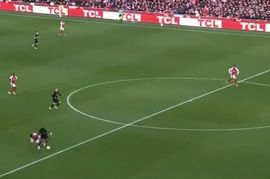
Arsenal’s defeat to West Ham has given Liverpool a significant advantage in the Premier League title race, as the 10-man Gunners suffered a 1-0 loss at the Emirates Stadium.
The result prevented Arsenal from closing the gap on their title rivals, with the only goal of the match coming from a swift counterattack led by Aaron Wan-Bissaka. The defender delivered a pinpoint cross to Jarrod Bowen, who found himself unmarked in the box and calmly headed past David Raya.
Arsenal’s troubles deepened when Myles Lewis-Skelly was sent off just over 10 minutes after coming on, following a foul on Mohammed Kudus that denied a clear goal-scoring opportunity.
With Mikel Arteta’s side now struggling to keep pace in the title race, Daily Star Sport has analyzed where the Arsenal boss got it wrong.
Missed Early Opportunities
Arsenal dominated possession in the first half with 63% of the ball and nine shots. However, only one of those efforts was on target. West Ham, despite seeing far less of the ball, were more clinical. They matched Arsenal’s number of shots on target but made theirs count.
The visitors posed a constant threat on the counter, with Wan-Bissaka exploiting space on the flank to bypass Arsenal’s defense. His understanding with Bowen proved crucial, as the forward was perfectly positioned to nod home the winning goal.
Merino Isn’t a Striker
Mikel Merino played a decisive role off the bench in Arsenal’s previous match against Leicester, scoring twice to secure victory. As a result, Arteta opted to start him in an attacking role against West Ham. However, this decision appeared premature.
While Merino found himself in some promising positions inside West Ham’s penalty area, he also drifted out of play at key moments. His two goals against a struggling Leicester side may not have been enough justification to turn a backup plan into a primary strategy. The injury to Kai Havertz has left Arsenal with limited options, but Merino still has a lot to prove as a reliable attacking replacement.
Questionable Substitutions
Arteta’s changes in the 56th minute did not go as planned. Lewis-Skelly replaced Riccardo Calafiori, but 17 minutes later, he was sent off, leaving Arsenal at a disadvantage.
The other major change saw Declan Rice make way for Oleksandr Zinchenko, a move that raised eyebrows. When a team is struggling, managers typically rely on key players to make an impact. Rice is one of those players, so taking him off for Zinchenko—who lacks Rice’s midfield control and passing range—was a puzzling decision. Substitutions can be a game-changer, but in this case, Arteta’s choices backfired.
Failure to Contain the Counterattack
Possession statistics may reflect dominance, but they don’t win matches—goals do. While Arsenal had the better stats, West Ham executed their counterattacking plan to perfection.
Graham Potter’s side was content to sit deep and absorb pressure before striking on the break. Their disciplined defensive setup allowed them to exploit Arsenal’s vulnerabilities in transition. The Gunners struggled to cope with West Ham’s rapid counters, and in a desperate attempt to halt one such attack, Lewis-Skelly resorted to a foul that led to his red card.
More Game Time for Nwaneri?
Arsenal’s performance against West Ham was lackluster, and it was evident that something was missing. Injuries have undoubtedly played a role, but this is an opportunity for other players to step up.
One bright spark was 17-year-old Ethan Nwaneri, who showed plenty of energy and attacking intent. His sharp first touches and confidence on the ball excited the home crowd, and despite his youth, he displayed a sense of leadership.
Nwaneri’s determination to push forward was clear, and Arteta may need to integrate him more into the squad’s attacking play. The youngster’s drive could be what Arsenal need to inject some much-needed creativity into their performances.
Leave a Reply